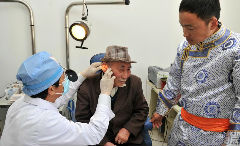First guideline issued on improving mental health
2017-01-20
chinadaily.com.cn
Mental health education and awareness will be popularized and promoted across China by 2020, according to the country’s first government guideline aimed at promoting psychological well-being, which was released on Jan 19.
Various measures are expected to provide Chinese with better access to mental health services and improve the general level of mental health by 2030, according to the guideline, released by 22 ministries and ministerial-level departments led by the National Health and Family Planning Commission.
The guideline was released against a backdrop of rising mental illness in China caused by escalating stress in an era of rapid economic and social transformation, according to the commission.
Available mental health services, meanwhile, fall far short of demand, it said.
The guideline said the government will make more efforts to improve mental health education and awareness among the public, so they can better prevent psychological problems and deal with them properly if they do occur.
Employers should provide mental health education and the necessary training to their employees, and provide timely assistance to employees prone to mental problems, such as those who are experiencing trauma, it said.
All schools, from kindergartens through to universities, should pay importance to students’ psychological well-being and help them with psychological development, the guideline said.
In particular, timely interference should be provided to migrant children and those who have been bullied or experienced domestic violence or sexual assault, the guideline said.
Health authorities are encouraged to improve the mental health services they provide and educational authorities should encourage schools to invest more in the cultivation and training of mental health talent, the guideline added.
Xie Bin, a mental health expert from the Shanghai Mental Health Center, said a major problem hindering the development of mental health services in China is lack of talent.
The total number of certified psychiatrists in the country was about 27,000 by the end of 2015, according to the National Health and Family Planning Commission, but more than 40,000 are needed to meet demand, Xie said.
Moreover, few universities in China provide majors in areas such as clinical psychology, resulting in a scarcity of talent, Xie said.
“In this area, we need to learn more from developed countries to cultivate specialists,” he said. “The government also needs to issue favorable polices to import such talent from overseas.”
Qiao Zhihong, from Beijing Normal University’s School of Psychology, said the market needs regulation to promote the development of mental health services in China.
“We have a large number of psychological advisers, but few of them are professional,” he said.
“Legislation is also needed so psychological therapists are certified like doctors in China.”


